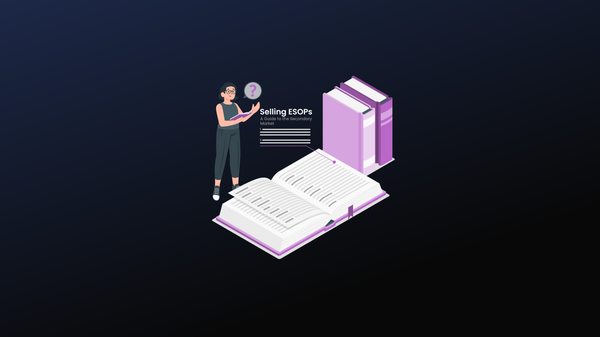Dematerialisation of Shares for Startups and Private Companies in 2025
The Ministry of Corporate Affairs (MCA) has mandated the dematerialisation of shares for private companies through Rule 9B under the Companies (Prospectus and Allotment of Securities) Rules, 2014. This amendment requires non-small private companies to convert physical share certificates into electronic form by September 30, 2024.
For startup founders, key decision-makers, and management, Rule 9B is more than a compliance mandate—it’s an opportunity to modernize equity management, improve investor trust, and simplify operational processes. This comprehensive guide details every aspect of dematerialisation, from compliance deadlines to practical steps for startups.
What is DEMAT (Dematerialisation) of Shares?
DEMAT (Dematerialisation) refers to the process of converting physical share certificates into electronic format, stored securely in a demat account managed by depositories such as:
- National Securities Depository Limited (NSDL)
- Central Depository Services Limited (CDSL)
These depositories, in coordination with Depository Participants (DPs), facilitate the seamless management of digital securities.
Why Should Startups Care About Dematerialisation?
- Regulatory Compliance: Required for private companies exceeding small company thresholds.
- Investor Trust: Professionalized equity structures attract better investor confidence.
- Operational Efficiency: Simplifies share transfers, allotments, and record-keeping.
- Risk Mitigation: Reduces risks of loss, theft, and forgery associated with physical certificates.
Who Must Comply with Rule 9B?
Applicability of Rule 9B
Rule 9B applies to all private companies that exceed the thresholds of a small company, as defined under the Companies Act:
| Criteria | Small Company Thresholds |
|---|---|
| Paid-up Capital | Less than ₹4 crore |
| Turnover (Annual) | Less than ₹40 crore |
If a company surpasses these thresholds as of March 31, 2023, it must comply with Rule 9B by September 30, 2024. Companies crossing these thresholds after this date must comply within 18 months of the fiscal year-end. Subsidiaries of Public Companies must also comply under Rule 9A, which applies to unlisted public companies.
Who is Exempt?
- Small Companies: Meet capital and turnover thresholds above.
- Government Companies: Fully exempt.
- Section 8 Companies Limited by Guarantee: Not covered, but Section 8 companies with share capital are required to comply.
- Nidhi Companies: Exempt from Rule 9B as they are mandatorily registered as public companies.
Step-by-Step Guide to Dematerialisation for Startups
Dematerialisation may seem overwhelming if you’re new to the process, but it’s a crucial step for compliance, efficiency, and transparency in managing your startup's shares. This guide will take you through the process, step by step, while explaining the “why” behind each action.
1. Amend the Articles of Association (AoA)
The Articles of Association (AoA) is the internal rulebook that governs your company’s operations. Before you begin dematerialising shares, your AoA must include a provision that explicitly allows shareholders to hold and issue shares in dematerialised form.
Why is this necessary?
If your AoA does not include this clause, the company cannot legally proceed with dematerialisation.
Steps to amend the AoA:
- Convene a Board Meeting:
- Pass a board resolution approving the amendment.
- Draft the proposed changes to include a clause for dematerialised shares.
- Legal Review:
- Share the updated draft with legal advisors to ensure compliance with Rule 9B.
- Schedule an Extraordinary General Meeting (EGM):
- Notify shareholders and obtain their approval for the amendment through a special resolution (75% approval required).
- File Form MGT-14:
- Submit Form MGT-14 to the Registrar of Companies (RoC) within 30 days of the resolution being passed.
- Attach the amended AoA, board resolution, and shareholder approval details.
2. Appoint a Registrar and Transfer Agent (RTA)
A Registrar and Transfer Agent (RTA) is a SEBI-registered intermediary that facilitates the dematerialisation process. While appointing an RTA is not mandatory, they simplify coordination between the company, the depositories (NSDL/CDSL), and shareholders.
Why is this helpful?
RTAs manage shareholder records, verify dematerialisation requests, and streamline communication between all parties.
What to do:
- Identify and appoint a SEBI-registered RTA to handle the dematerialisation process.
- If you choose not to hire an RTA, the company will need to manage the coordination internally, which may require additional resources.
3. Obtain an International Securities Identification Number (ISIN)
An ISIN is a 12-digit unique code that identifies each type or class of share issued by the company (e.g., equity shares, preference shares). It’s essential for dematerialising shares.
Why is this required?
An ISIN acts as the identifier for digital shares in the demat system. Without it, shares cannot be converted to electronic form.
Steps to apply for an ISIN:
- Appoint an RTA or Work Directly with Depositories:
- Coordinate with NSDL or CDSL, either directly or via the appointed RTA.
- Prepare and Submit Required Documents:
- Certificate of Incorporation: Proof of company registration.
- Board Resolution: Authorizing the ISIN application.
- Share Capital Structure: Details of authorised, issued, and paid-up share capital.
- List of Shareholders: Names and holdings of existing shareholders.
- ISIN Approval:
- The depository verifies the submitted documents and assigns an ISIN.
- Share the ISIN details with all stakeholders.
- Important: A separate ISIN is required for each class of security (e.g., equity, preference shares).
4. Facilitate Demat Account Setup for Stakeholders
A demat account is an electronic account where shareholders hold their dematerialised shares. Promoters, directors, and all shareholders must open demat accounts to complete the conversion process.
Why is this necessary?
Without a demat account, physical shares cannot be converted into electronic format.
Steps to open a demat account:
- Choose a Depository Participant (DP):
- Shareholders must select a DP affiliated with either NSDL or CDSL. Most banks and brokerage firms act as DPs.
- Submit Required Documents:
Shareholders need to provide:- PAN Card (mandatory for tax compliance).
- Address Proof: Aadhaar, passport, or utility bills.
- Bank Details: For linking the demat account.
- KYC Verification:
- Complete the Know Your Customer (KYC) process with the DP.
- Activate the Demat Account:
- Once verified, the demat account becomes active, enabling shareholders to hold electronic shares.
5. Convert Physical Shares into Digital Form
The actual dematerialisation process involves converting physical share certificates into electronic form.
Documents required for dematerialisation:
- Dematerialisation Request Form (DRF):
- Shareholders must obtain a DRF from their DP. A separate DRF is required for each ISIN.
- Original Share Certificates:
- Attach the physical certificates to the DRF.
- KYC Documents:
- Self-attested copies of the PAN card and address proof (old and current).
Steps for dematerialisation:
- Shareholders submit the DRF and physical share certificates to their DP.
- The DP verifies the request and forwards it to the RTA for approval.
- The RTA cross-checks the details and authenticates the certificates.
- Once approved, the shares are:
- Converted into electronic form.
- Credited to the shareholder’s demat account.
- Shareholders receive confirmation from their DP.
6. Ensure Compliance for Key Stakeholders
Key personnel such as promoters, directors, and Key Managerial Personnel (KMPs) must dematerialise their shares before the company can:
- Issue new securities.
- Conduct share buybacks.
- Offer bonus or rights shares.
What to do:
- Confirm that all key personnel have opened demat accounts.
- Ensure they submit their share certificates for dematerialisation well before the compliance deadline.
7. File Half-Yearly Compliance Reports (Form PAS-6)
After initiating the dematerialisation process, companies must file Form PAS-6 twice a year to report the status of dematerialised and physical shares.
Why is this important?
Filing PAS-6 ensures regulatory transparency and helps authorities monitor compliance under Rule 9B.
Deadlines for Form PAS-6:
- For April–September: File by November 29.
- For October–March: File by May 30.
Steps to file Form PAS-6:
- Prepare details of:
- Total share capital.
- Number of shares held in physical and dematerialised form.
- Get the form certified by a Company Secretary or Chartered Accountant in practice.
- File Form PAS-6 through the MCA portal within the deadline.
Costs Involved in Dematerialisation
| Cost Component | Description | Estimated Cost |
|---|---|---|
| ISIN Application Fees | Fees for assigning ISIN via NSDL/CDSL. | ₹5,000–₹10,000 |
| RTA Fees | Optional cost if an RTA is appointed. | ₹10,000–₹50,000/year |
| Depository Participant (DP) Charges | Account maintenance and transaction fees. | ₹500–₹2,000/year |
| Compliance Costs | Filing fees for PAS-6 and legal certifications. | ₹10,000–₹20,000 |
Note: Costs may vary depending on service providers and shareholder numbers.
FAQs: Dematerialisation Under Rule 9B Applicability
1. Who is required to comply with Rule 9B?
A: All private companies that are not classified as small companies under the Companies Act must comply. Small companies and government companies are exempt.
2. What happens if a private company transitions from small to non-small status?
A: If a company ceases to qualify as a small company as of March 31, 2023, it must comply with Rule 9B by September 30, 2024. For companies exceeding the small company threshold after March 31, 2024, compliance is required within 18 months of the fiscal year-end.
3. Does Rule 9B apply to Section 8 companies?
A: Yes, Section 8 companies with share capital must comply. Section 8 companies limited by guarantee are exempt.
4. Is Rule 9B applicable to foreign shareholders?
A: Yes. Foreign shareholders must obtain a PAN card and open a demat account in India to comply with Rule 9B requirements.
5. Are Nidhi companies covered under Rule 9B?
A: No, Nidhi companies are exempt as they are incorporated as public companies and governed under Rule 9A.
6. Does Rule 9B apply to securities other than equity shares?
A: Yes, Rule 9B applies to all types of securities, including preference shares, debentures, warrants, and convertible instruments.
Process and Compliance
7. What is the first step to achieving compliance under Rule 9B?
A: The first step is to amend the company’s Articles of Association (AoA) to allow shares to be held in dematerialised form.
8. How does a company obtain an ISIN?
A: An ISIN is assigned by NSDL or CDSL after the company submits required documents, such as the Certificate of Incorporation, board resolution, and share capital details, through an RTA or directly.
9. Is it mandatory to appoint an RTA for dematerialisation?
A: No, appointing an RTA is optional. However, RTAs simplify the process by acting as intermediaries between the company, depositories, and shareholders.
10. Can private companies issue physical shares before September 30, 2024?
A: Yes, private companies can issue physical shares before this date, but these shares must be converted into electronic format by the compliance deadline.
11. What is the role of Form PAS-6 in compliance?
A: Form PAS-6 is a half-yearly compliance report that private companies must file to declare the status of their dematerialised securities.
Challenges and Edge Cases
12. What happens if shareholders refuse to open demat accounts?
A: Shareholders who refuse to dematerialise their holdings cannot transfer shares or subscribe to new issues.
13. Can physical shares be transferred after September 30, 2024?
A: No, physical shares cannot be transferred after this deadline unless they are converted to electronic form.
14. Does dematerialisation override share transfer restrictions in private companies?
A: No, dematerialisation does not override restrictions on share transfers. Private companies can request depositories to freeze ISINs, ensuring compliance with transfer restrictions outlined in their AoA.
15. What happens if a company fails to comply with Rule 9B?
A: Non-compliance results in penalties under Section 450 of the Companies Act:
Company: ₹10,000 + ₹1,000 per day (up to ₹2,00,000).
Officers in default: ₹10,000 + ₹1,000 per day (up to ₹50,000).
16. What if discrepancies arise between physical share records and dematerialised holdings?
A: The company must reconcile discrepancies with the depository and RTA to ensure accurate reporting.
Costs and Financial Implications
17. What are the costs involved in dematerialisation?
A: Costs include ISIN application fees, RTA charges, DP fees for account maintenance, and compliance filing costs.
18. Are there any ongoing fees for maintaining dematerialised securities?
A: Yes, companies must pay annual depository charges, and shareholders may incur demat account maintenance fees.
19. Do companies need to pay stamp duty for dematerialisation?
A: Stamp duty applies to the issuance of shares, but no additional stamp duty is levied for the dematerialisation of shares.
Startup-Specific Concerns
20. What are the benefits of dematerialisation for startups?
A: Dematerialisation simplifies cap table management, ensures regulatory compliance, and reduces due diligence risks during fundraising.
21. How does dematerialisation impact fundraising?
A: Investors prefer startups with clean, digital equity records, as it simplifies audits and reduces operational risks.
22. How can startups manage dematerialisation with limited resources?
A: Platforms like Tabulate help automate compliance, manage filings, and reduce administrative overhead, making dematerialisation more accessible for resource-constrained startups.
How Tabulate Streamlines Dematerialisation for Private Companies and Startups
At Tabulate, we simplify Rule 9B compliance so you can focus on your business. Our platform automates processes, ensures compliance, and eliminates complexity with minimal input from your team.
1. Complete Dematerialisation Management
We manage the entire dematerialisation process by partnering with trusted SEBI-registered RTAs to ensure a smooth, fast, and error-free transition.
What we handle for you:
- Document Preparation: Draft resolutions, notifications, and ISIN applications.
- Seamless Coordination: Liaise with shareholders, RTAs, and depositories (NSDL/CDSL).
- Shareholder Onboarding: Guide stakeholders through the demat account setup process.
- Process Tracking: Monitor progress and provide real-time updates on your Tabulate dashboard.
2. Fast and Digital Amendments
We make amending the Articles of Association (AoA) and obtaining approvals effortless:
- Digital Execution: Integrated e-signatures for quick approvals.
- Automated Templates: Pre-approved, compliance-ready formats for board and shareholder resolutions.
3. Effortless Compliance and Reporting
Stay ahead of deadlines with automated compliance tracking and reporting:
- Form PAS-6 Made Easy: Export half-yearly reports in the MCA-prescribed format directly from the platform.
- Digital Register of Members: Maintain a real-time, compliant Form SH-1.
- Automated Alerts: Never miss a filing deadline.
Why Choose Tabulate?
- Speed and Accuracy: Complete compliance in as little as 2–3 weeks.
- Transparency: Real-time updates on progress via your dashboard.
- Seamless Collaboration: Centralized coordination between stakeholders, RTAs, and filings.
- Expert Support: Compliance experts guide you every step of the way.
Ready to Simplify Dematerialisation?
With Tabulate, compliance becomes fast, stress-free, and transparent.
Conclusion
Dematerialisation is not just about compliance—it’s about building trust, ensuring operational efficiency, and future-proofing your equity management practices. With Tabulate, you can achieve seamless compliance while focusing on your startup’s growth.



